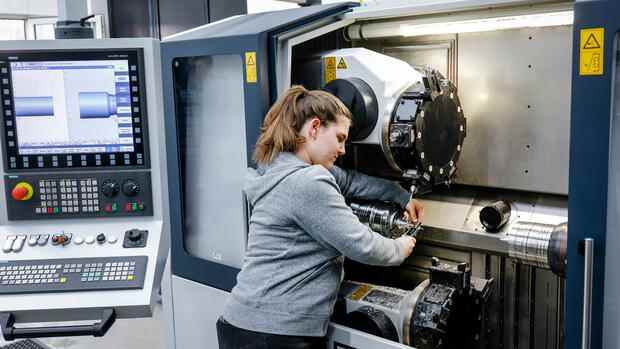Employers and trade unions agree that the vocational orientation of young people must be strengthened.
(Photo: imago images/Rupert Oberhäuser)
Berlin The federal government wants to counter the shortage of skilled workers with a training guarantee, more further training, a better work-life balance, flexible transitions to retirement and additional immigration. Sufficiently qualified staff is “crucial for the ability to innovate and perform on the way to a socio-ecological market economy,” according to the approximately 40-page draft for the federal government’s new skilled labor strategy, which is available to the Handelsblatt. It is to be discussed with the social partners at the specialist summit on Wednesday.
While there are job cuts in some sectors and regions of Germany, skilled workers are urgently needed elsewhere, some with completely new qualifications, according to the paper. In addition, the supply of labor will decrease due to the aging of society.
According to the Federal Employment Agency (BA), there were staff shortages in 148 professions last year. The trades, construction industry, health and educational professions and the IT industry were particularly affected, but salespeople and professional drivers were also wanted. The draft goes on to say that increasing difficulties in finding personnel are to be expected both for this year and for the coming year. According to estimates by the federal government, by 2026 there will be 240,000 more jobs to be filled than there are workers available.
Read more about the shortage of skilled workers here:
Top jobs of the day
Find the best jobs now and
be notified by email.
Especially in the training occupations, significantly more people will retire in the next five years than those with training will enter the workforce. In the trades alone, 125,000 companies were looking for a successor over the next five years, said trades president Hans Peter Wollseifer to the Handelsblatt. It is good that the government is taking on the issue, said Wollseifer, even if he lacks a medium- and long-term strategy. “What I’m missing above all is a clear plea for promoting the equality of professional and academic education.”
The SPD, Greens and FDP had agreed on a training guarantee in the coalition agreement so that all young people who opt for dual training also get a place. However, the specific form is still unclear.
In time for the skilled workers’ summit, the national board of the German Trade Union Confederation (DGB) decided on Tuesday on its own concept for a pay-as-you-go training guarantee, which is also available to the Handelsblatt. The DGB criticizes that only two-thirds of all young people who are interested in training succeed in making the transition to regular training, the rest end up on hold. A good 2.3 million of the 20 to 34-year-olds have no professional qualifications, and the number has been rising continuously for years. At the same time, more and more companies are withdrawing from training.
The DGB therefore proposes a future fund with which training companies can be supported and external training and support services can be financed. All companies with at least five employees should pay in. In addition, the trade unions are demanding, among other things, greater professional orientation in schools and the promotion of mobility for trainees through free trainee tickets.
It is good that the traffic light has decided on a training guarantee, said the deputy DGB chairwoman Elke Hannack to the Handelsblatt. However, the plan should not stop halfway. Only a pay-as-you-go system creates effective incentives for companies to provide more training places, said Hannack. “The training guarantee must not become an alibi guarantee that leaves young people interested in training out in the rain.”
Read more about immigration here:
In addition to strengthening training, the federal government wants to promote lifelong learning, get more women from part-time to full-time jobs and improve the quality of work so that employees can do their work healthy and motivated. The fifth field of action in the Skilled Labor Strategy is immigration. Interior Minister Nancy Faeser and Labor Minister Hubertus Heil (both SPD) want to present a draft law to simplify immigration law in the fall.
From the point of view of the Confederation of German Employers’ Associations (BDA), however, the federal government is not going far enough. “Politics are focusing on supposedly low-conflict issues when it comes to securing skilled workers,” said Managing Director Steffen Kampeter of the Handelsblatt. This does not do justice to the size of the task. “As correct as simplified immigration into the labor market is, we would like to see just as much vigor in working for life,” said Kampeter. Employers have long advocated linking the retirement age to increasing life expectancy.
The BDA prepared its own ten-point paper for the summit with suggestions for securing skilled workers. Among other things, improved career orientation, greater digitization and automation, a modern working time framework and better integration and participation opportunities for people with a migration background are required.
More: Interview with the new BA boss Andrea Nahles: The planned increase in the unemployment contribution could be too low
